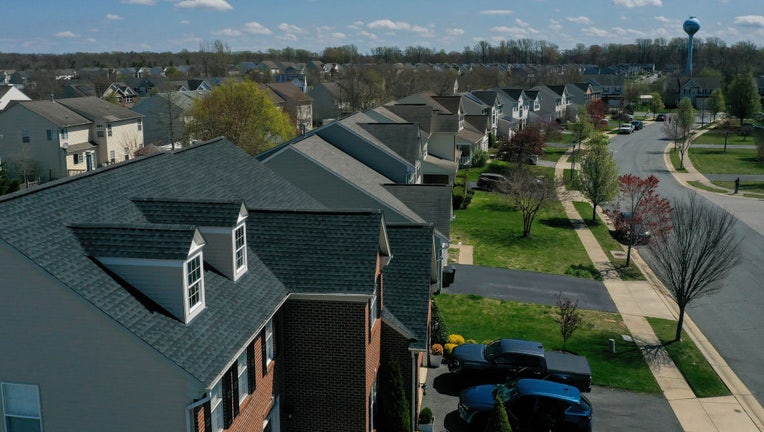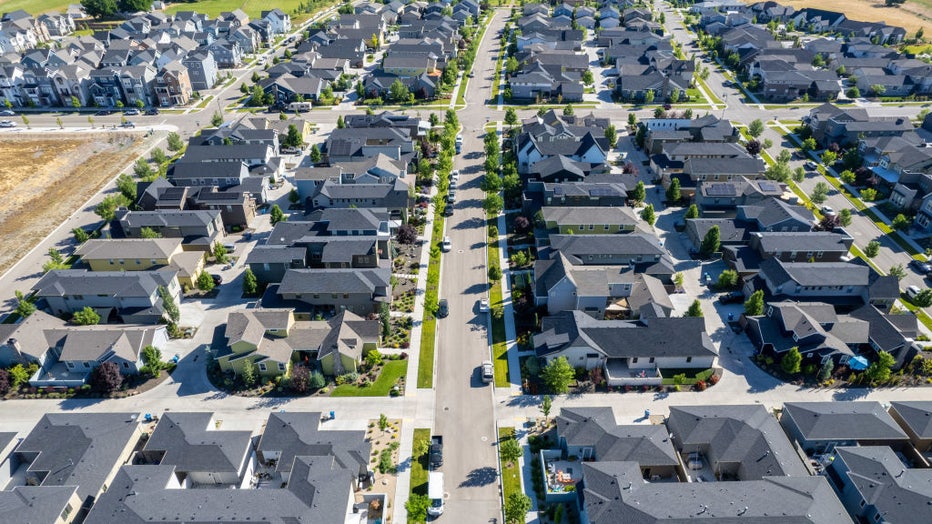Housing market could tumble into a 'deep freeze' if US defaults on its debt

FILE - Homes in Centreville, Maryland, on April 4, 2023. Photographer: Nathan Howard/Bloomberg via Getty Images
If the U.S. defaults on its debt, it could have potentially catastrophic effects for the U.S. economy – including the already fragile housing market.
That's according to a new analysis from Zillow, which projected that home-buying costs could surge by a stunning 22% if Congress fails to raise the debt limit by June 1. On top of that, the 30-year mortgage rate would likely skyrocket above 8%, the highest since the early 2000s, according to the report, authored by Zillow senior economist Jeff Tucker.
Zillow laid out a bleak scenario for the housing market in the case of a first-ever debt default: Tucker projected 23% fewer sales of existing homes to a seasonally adjusted annualized rate of 3.3 million in September. And by the end of 2024, home values would be down about 5%.
WHAT IS THE DEBT CEILING, AND WHAT DOES IT MEAN FOR YOU?
"Much uncertainty surrounds these estimates, but there’s little doubt that a default would be a major negative shock to housing market activity," Tucker wrote in the report (titled "A debt ceiling default would send the US housing market back into a deep freeze").
The clock is running out for lawmakers to lift the debt limit: Treasury Secretary Janet Yellen warned earlier in May the country could run out of money as early as June 1 if the ceiling is not raised.

Debt ceiling meetings will happen next week
President Joe Biden’s meeting Friday with congressional leaders on the debt limit crisis was abruptly postponed to next week, with staff-level talks making progress and expected to continue through the weekend, the White House and congressional aides said. The White House said staff would continue to hold discussions, and the delay was billed as a sign of positive exchanges between Republican leaders, Democratic counterparts and Biden.
The Zillow analysis comes amid a prolonged standoff over the debt limit. Republicans, who control the House, passed a bill that raises the borrowing limit, and also includes budget cuts. In turn, President Biden and his fellow Democrats, who control the Senate, have insisted on a "clean" debt ceiling bill and will negotiate any spending cuts separately.
DEBT CEILING SHOWDOWN RISKS TRIGGERING ‘SELF-INFLICTED’ RECESSION
Biden hosted House Speaker Kevin McCarthy, R-Calif., and other congressional leaders at the White House last week to discuss the nation's spending and debt, but the meeting concluded with no consensus reached. The president struck a more optimistic note on Sunday, saying that he believed a deal could be reached.
"I really think there’s a desire on their part, as well as ours, to reach an agreement, and I think we’ll be able to do it," Biden told reporters Sunday in Delaware.

FILE - Houses in the Harris Ranch community of Boise, Idaho, on July 1, 2022. Photographer: Jeremy Erickson/Bloomberg via Getty Images
However, McCarthy cast doubt on that statement Monday morning. He told NBC News during an interview the two sides are still "far apart."
"It doesn’t seem to me yet that they want a deal," he said.
Biden, McCarthy and the other congressional leaders will meet again Tuesday.
GET FOX BUSINESS ON THE GO BY CLICKING HERE
If the U.S. failed to raise or suspend the debt limit, it would eventually have to temporarily default on some of its obligations, which could have serious negative economic implications. Interest rates would likely spike, and demand for Treasuries would drop; even the threat of default can cause borrowing costs to increase, according to the Committee for a Responsible Federal Budget.
While the U.S. has never defaulted on its debt before, it came close in 2011, when House Republicans refused to pass a debt-ceiling increase, prompting rating agency Standard and Poor's to downgrade the U.S. debt rating one notch.

